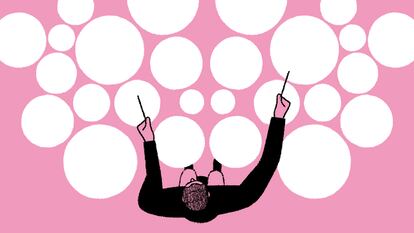I’m happy when I’m in a hurry, I thrive on being overworked
I used to brag about being lazy, but it was just for show. I’d rather be multitasking on a deadline than searching for some ineffable truth in the quiet of nature. Life is best lived with urgency.

When I was 17, I had a show on a pirate radio station. It was called Perdiendo el tiempo (“Wasting Time”), because it was about nothing – like Seinfeld. A few years later, when I collected a few texts I’d written and published them as a blog, I subtitled it: ‘Laziness, uselessness, wasted time.’ After I published my first few books, journalists started asking me to define myself. I told them I was a lazy person who worked too much.
I trusted my vocation for indolence like I trusted the vocational devotions of others – with utter naiveté. My college friends would muse, dreamily, of their hopes for a simple life: they would be a bookseller in a small town, write poetry at lunchtime, not burn themselves out in the fatuous fires of professional ambition. Of course, they were the most vicious predators of all – the ones who elbowed their competitors in the ribs to get ahead, with ruthless efficiency. Since then, every time I hear someone whisper about wanting to live a secluded life in a mountain village, I my guard goes up and check my back for daggers.
I could call the kettle black, but I refused to question my own faith in my laziness – a trait I cultivated for years. I didn’t realize that I was just flattering myself. Far from subverting the establishment, I was gratifying it. Lazy people are cool, and great at selling products.
Recently, I was being interviewed for a television program and the presenter was trying to tease me: “You’re a writer, so you get up at noon, right? You’re not used to actually having to work.” In another time, I would have gone along with the joke, but in that moment, I realized just how absurdly far off the stereotype was from my actual life. I get up at 6am and work non-stop all day. That week, like the many before it, I had spent all weekend either glued to my computer or reading and underlining the towering stack of books on my desk. I couldn’t remember the last real vacation I’d had, save for the occasional morning at the beach. I mean hell, since I was 21, I had only worked harder and harder, always taking on more than I could manage. I didn’t come on TV to be called lazy by some professional jokester. I was the only one who could call me that.
This epiphany could have shaken me awake, given me the lucidity of a monk, made me ask myself: My God! What was I doing with my life? The logical thing would have been to detach myself from the vain exigencies of productivity, follow the enlightened path set out by what few wise men the world has produced, and resign from professional life in search of truth. I was the author, after all, of La España vacía (Empty Spain), and many readers had told me how that book had moved them to take life more calmly, had helped them discover the extent to which urban and capitalist acceleration had alienated them from what really mattered in life.
What a beautiful book I could write if I could just get away from the hustle and noise of the city. How pretty it would look – a personal reflection in slow, musing prose – in the window of a small village bookshop, surrounded by the smell of woodsmoke and the sounds of a sheepdog barking in the distance. Urban readers would love it. I would promote it by touring every major city in Spain, giving endless presentations and interviews, leaving no time to sleep or eat, jumping off one high-speed train and onto the next – all while praising the benefits of a quiet and secluded life. I would take commissions for articles I would have to write at night, skipping dinner to pack for the next day’s journey, since the book’s translations would have me touring across Europe, hopping from one festival to the next. In the end, defeated by the dark circles under my eyes, exhausted from extolling the benefits of the peace and quiet of the countryside, my doctor would up the dosage of my hypertension meds, prescribe me a pill for my anxiety, another for my insomnia, and urge me to take it easy lest I collapse from a heart attack. If you think this sounds like hyperbole, take a glance at the intercontinental itinerary of Byung-Chul Han, the hyperactive and hyper-popular philosopher who never stops writing essays, delivering lectures, and giving interviews criticizing the work pace of others, while refusing to moderate his own
Personally, I give everything to my work because I’m passionate about what I do. I don’t suffer it with resignation; I enjoy it. Another philosopher, Spanish writer and scientist Remedios Zafra, says that having a passion for your job is just capitalism’s spider web, catching us all like little flies. And while I share her critique of exploitation and precariousness in the cultural professions, it’s hard for me to feel like I’m a victim when my work gives me so much pleasure. I used to brag about being lazy, but it was just for show. I’m not hiding anymore: The truth is, I love being in a hurry, and I thrive on being overworked. I enjoy multitasking with a passion. As I write, I’m about to go live on my weekly radio show. I was just texted the script, and I’m taking a break from writing to review it and suggest a few changes. Tomorrow I have two deadlines for articles that I’ve only half finished – and I still don’t know when I’ll find the time wrap them up – and the day after tomorrow I’m giving a lecture 300 miles away. The galley proofs have just been delivered for my next book, which I have to review in less than a week.
Some would rather crawl back into bed and cry than deal with all that, but I love being busy, and I’m good at it. I’m great at managing stress, as the corny entrepreneurs say, and I don’t see any shame in it, nor do I feel like my life is slipping away. This is what life is all about. Life is better when it’s lived with urgency – not searching in the silence of nature for an ineffable truth that lies on the other side of a mountain. Life is noisy. Life is messy.
I have a friend – a successful lawyer – with an intense passion for literature. He dreams about leaving the law and retiring so that he can write the novel he’s been obsessing about for years, but never has the time to compose. Sometimes I encourage him: You’re swimming in money, you don’t need any more, why don’t you just quit that job you hate and start doing what you love. Last time I told my friend this, he lowered his voice and confessed his true fear: “But what if I quit only to find out I’m actually a really bad writer?”
Tu suscripción se está usando en otro dispositivo
¿Quieres añadir otro usuario a tu suscripción?
Si continúas leyendo en este dispositivo, no se podrá leer en el otro.
FlechaTu suscripción se está usando en otro dispositivo y solo puedes acceder a EL PAÍS desde un dispositivo a la vez.
Si quieres compartir tu cuenta, cambia tu suscripción a la modalidad Premium, así podrás añadir otro usuario. Cada uno accederá con su propia cuenta de email, lo que os permitirá personalizar vuestra experiencia en EL PAÍS.
¿Tienes una suscripción de empresa? Accede aquí para contratar más cuentas.
En el caso de no saber quién está usando tu cuenta, te recomendamos cambiar tu contraseña aquí.
Si decides continuar compartiendo tu cuenta, este mensaje se mostrará en tu dispositivo y en el de la otra persona que está usando tu cuenta de forma indefinida, afectando a tu experiencia de lectura. Puedes consultar aquí los términos y condiciones de la suscripción digital.









































